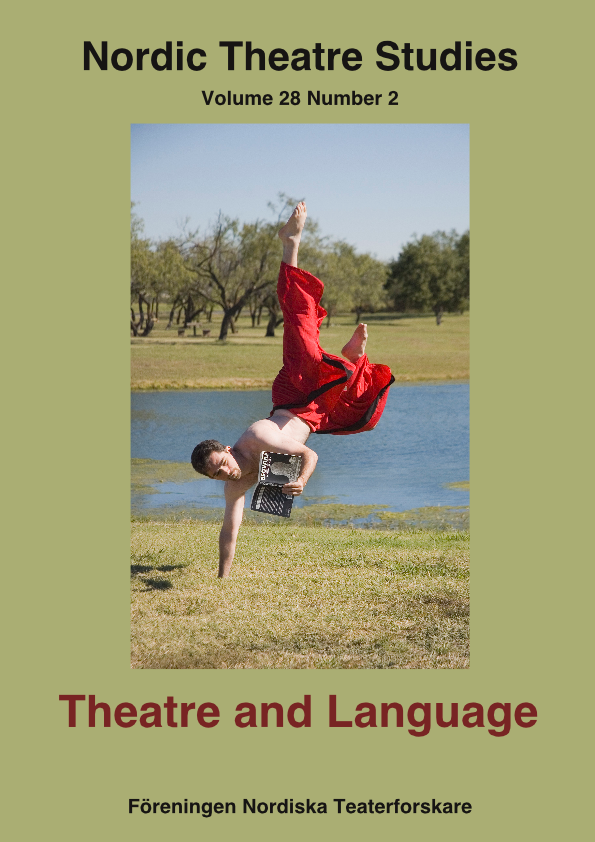Performance as Philosophy — the universal language of the theatre revisited
DOI:
https://doi.org/10.7146/nts.v28i2.25604Keywords:
Performance philosophy, holistic, energy-paradigm, immediate experience, sensuous experience, imagination, consciousness studies.Abstract
The history of philosophy is widely considered as the history of exercises in speculation. However, it is also possible to understand philosophy not as the outcome of speculation, but at the attempt by philosophers to explain, make sense of, and ultimately share, their own experiences of a very subtle, powerful and spiritual nature. The growing field of performance philosophy begins to acknowledge the potential of considering philosophy as an expression of immediate experience rather than distant speculation. This acknowledgement can take the shape of employing performance to express philosophy — in more immediately experienced ways than verbal language is ever able to convey. Writing about this non-verbal dimension is difficult, and the result limited by its very nature, but in this article, we discuss the principle, and provide an example in the performance philosophy, captured under the term of body thinking, of German philosopher and dancer Aurelia Baumgartner.References
Anderson, Rosemarie & William Braud. 2011. Transforming Self and Others Through Research: Transpersonal Research Methods and Skills for the Human Sciences and Humanities. Albany: SUNY Press.
Bachelard, Gaston. 1983. Water and Dreams: An Essay on the Imagination of Matter. Dallas: The Pegasus Foundation, Dallas.
Bachelard, Gaston. 1994. The Poetics of Space. Boston: Beacon Press.
Baumgartner, Aurelia. 2016. “’Catch me if you can!’ –Eurydice 2012 Reloaded: Notes on the Performance”, in Daniel Meyer-Dinkgräfe (ed.). Consciousness, Theatre, Literature and the Arts 2015, Cambridge Scholars Publishing, Newcastle, 1-16.
Chalquist, Craig. N.d. A Glossary of Jungian Terms. Online at http://www.terrapsych.com/jungdefs.html. accessed 18 September 2016.
Dewey, John. 1934. Art as Experience. New York: Pedigree.
Fischer-Lichte, Erika. 1989. "Das Theater auf der Suche nach einer Universalsprache." Forum Modernes Theater 4:2, 115—21.
Hammer, Anita. 2007. "Exploring Ritual Dynamics by Means of Fiction: The Non-Ethics of the Inbetween", in Daniel Meyer-Dinkgräfe (ed.). Consciousness, Literature and the Arts 2007. Newcastle: Cambridge Scholars Publishing, 134—155.
Hammer, Anita. 2008. "Theatre as Event of Material Imagination Materialized.” Consciousness, Literature and the Arts 9:3.
Hammer, Anita. 2010. Between Play and Prayer: The Variety of Theatricals in Spiritual Performance. Amsterdam: Rodopi.
James, William. 2002. The Varieties of Religious Experience. London: Routledge.
Jung, Carl Gustav. 1969. Psykens Verden. Oslo: Cappelen.
Jung, Carl Gustav. 1964a. Man and His Symbols. London: Aldus Books.
Jung, Carl Gustav. 1964b. The Archetypes and the Collective Unconscious. Bollingen Series XX. Princeton: Princeton University Press.
Malekin, Peter and Ralph Yarrow. 1997. Consciousness, Literature and Theatre: Theory and Beyond. London: MacMillan.
Meyer-Dinkgräfe, Daniel. 2005. Theatre and Consciousness: Explanatory Scope and Future Potential. Bristol: Intellect.
Meyer-Dinkgräfe, Daniel. 2013a. Theatre, Opera and Consciousness: History and Current Debates, Rodopi, Amsterdam, 2013.
Meyer-Dinkgräfe, Daniel. 2013b. Observing Theatre: Spirituality and Subjectivity in the Performing Arts. Amsterdam: Rodopi
Myskja, Audun. 2014-16. A series of lectures and exercises at Senter for livshjelp, Ski, Norway.
Otto, Rudolf. 1959. The Idea of the Holy. London: Penguin Books.
Skjoldager Nielsen, Kim. 2016. “Über die Schwelle, in die Welt hinein. Das spirituelle Potential der Performance.” ("Across the Threshold, Into the World. The Spiritual Potential of Performance") double – magazin für puppen- figuren- und objekttheater No. 33 and https://www.youtube.com/watch?v=JhQqtNUIlTY This is a world of dew. Kristina Gjems. Premiere: 19.5.2015, Danses Hus, Oslo. http://www.dansenshus.com/forestillinger/this-is-a-world-of-dew/
Turner, Victor. 1982. From Ritual to Theatre. New York: PAJ Publications.
Downloads
Published
How to Cite
Issue
Section
License
The copyright belongs to the authors and Nordic Theatre Studies. Users can use, reuse and build upon the material published in the journal but only for non-commercial purposes. Users are allowed to link to the files, download the files, distribute the files on a local network (preferably by links), upload the files to local repositories if their institutions require them to do so, but not republish the files without proper agreements with the journal and the author.

